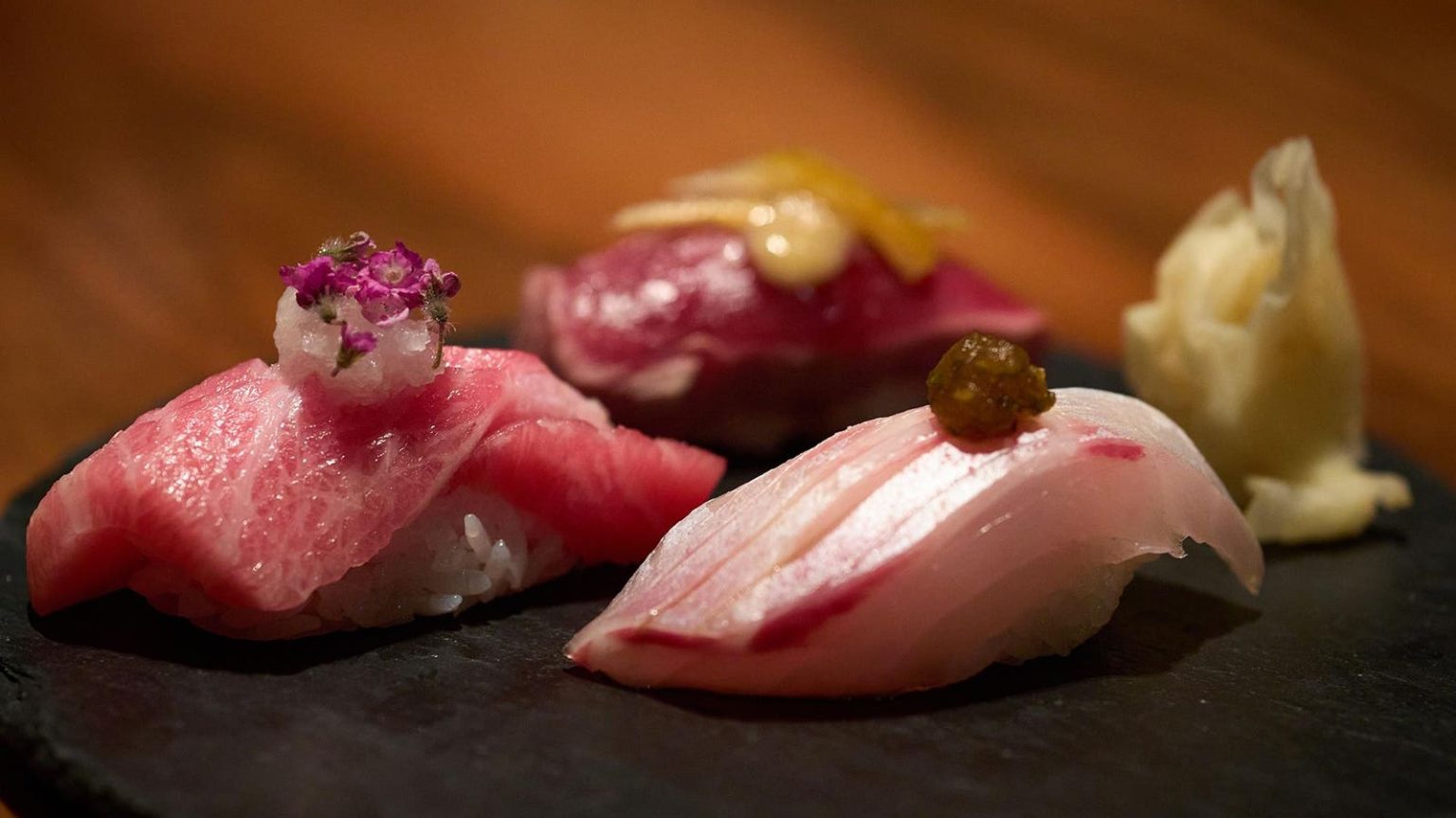Tucked away behind a blink-and-you-miss-it entrance on Bruton Place, just steps from the hustle and bustle of Oxford Circus, lies UMU, a restaurant that has quite literally stood the test of time.
Now in its 20th year of business, UMU may not find itself among the hot new London restaurant lists creating queues around the city, but an eight-year retention of its Michelin star speaks for itself.
ADVERTISEMENT
“It gives us reassurance that we have been doing things right,” says executive chef Ryo Kamatsu, reflecting on his own decade-long tenure in the restaurant.
Moving from Argentina to Japan to study as a young chef, Kamatsu never quite imagined this would be where he ended up. “[The experience] allowed me to immerse myself into Japanese culture. Without it, I would be cooking asados with chimichurri!” he muses.
His training at Kaiseki Ichimonji was both rigorous and foundational. “If there is a word that could describe my days at Ichimonji, it would be ‘intensity’. Eighteen months that started with the release of the first Michelin guide Tokyo and the restaurant being awarded two stars.”
As a pivotal part of a four-person team, in the pursuit of perfection, he was thrown into the deep end. Every person handled every task, front and back of house, from taking bookings to going to the Tsukiji market at the crack of dawn and sorting rice grains one by one.
ADVERTISEMENT
“Catering a tea ceremony Kaiseki before sunrise, returning to the restaurant for lunch service and continuing onto dinner service…” he recalls. “These are some of the experiences I now feel fortunate to have gone through, as they made me stronger and gave me all the basics of kaiseki in a short time,” he reflects.
Kaiseki is a traditional Japanese multi-course haute cuisine that exemplifies the pinnacle of Japanese culinary arts. Originating from the ancient Japanese tea ceremony,kKaiseki has evolved into a sophisticated and highly refined dining experience that balances the taste, texture, appearance, and colors of seasonal ingredients, all of which UMU turns out in spades.
Still, Kaiseki Ichimonji wasn’t the end of his culinary education. Before joining UMU, Kamatsu’s career was enriched by two significant experiences; first, co-founding Izakaya Sakabukuro (“it gave me the opportunity to take full responsibility for the restaurant opening and its entire operation”) and second, working at Chizza in Argentina with Franco Malacisa, a crucial stop in the development of his palate palate. “I learned how to build and balance flavors in an occidental way,” he says.
ADVERTISEMENT
When Kamatsu joined UMU in 2014, Yoshinori Ishii was at the helm, reshaping the restaurant with an emphasis on modern, localized Kaiseki and the use of Ikejime Cornish fish. Kamatsu took over at the end of 2020 and continued to build on this strong foundation. “Since I took over, I have developed on the strong concept that was built, focusing on top quality ingredients and a Kaiseki menu with approachable flavors, whilst keeping the original essence,” he says.
This continuity and evolution have kept UMU among the best Japanese restaurants in London, deeply rooted in Kyoto cuisine, known as Kyo-ryori.
Broadly, Kyoto cuisine is represented by Kyo-Kaiseki, Shojin ryori, and Obanzai, all of which benefit from the soft waters of Kyoto, which enhance the extraction of umami from kombu into the dashi. “At UMU, we also use soft water for our dashi that is present in many dishes. One of them is the ‘nimonowan’ soup, a dish I believe feeds the soul,” he says.
ADVERTISEMENT
With the demand for saké now higher than ever in the UK, Kamatsu has also enforced a bigger focus on UMU’s drinks pairings, led by head sake sommelier Ryan Johnson. “We start by trying individual components of the dishes together with potential pairings during the menu development phase. Ryan, with his developed palate, can identify hidden flavors in the dishes,” Kamatsu explains.
On the day a new menu is launched, the complete dishes and pairings are prepared for all UMU staff to taste, but if Johnson is still undecided on which pairings are best, he will leave it to the customers.”Ryan will serve them two wines or sakes with a dish,” he says, “then, based on their feedback, he will perfect the pairings.”
For a restaurant committed to traditional Japanese food preparation, it stands as one of a few ways UMU does things differently. “The five traditional techniques – raw, steamed, grilled, fried, and simmered, executed with traditional equipment and tools – are the basis of our menus. We use only a few innovative practices to complement and lift some of the dishes.”
ADVERTISEMENT
It is UMU’s dedication to tradition, in fact, that makes it stand out among its Michelin-starred peers. While other chefs might be filling their kitchens with smoke guns and sous vides, Kamatsu is filling his with the very best ingredients and the very best team.
In fact, the restaurant is now exclusively staffed by locally-trained chefs. “ This is something that I would not have imagined ten years ago, when three Japanese chefs were playing the important roles,” he says.
ADVERTISEMENT
As UMU embarks on its next decade, his vision is to keep evolving and training chefs that will spread Japanese food culture, “beyond sushi” — a feat for which the all-important Kaiseki menu is a brilliant showcase. Everything from the Mukozuke (Cornish lobster, tokoroten, hasuimo, shiso) and Nimonowan (fine clear soup, seabass, courgette, yuzu) to the Yakimono (Welsh lamb, smoked aubergine, gobo, pine nut miso) and Gohan (Scallop chazuke, tomato dashi) offers something you simply can’t find anywhere else.
UMU has achieved what many restaurants dream of, but few accomplish: a perfect blend of tradition and innovation, executed with unwavering precision and passion.
Let’s just hope you can find that entrance.
ADVERTISEMENT
Read the full article here





